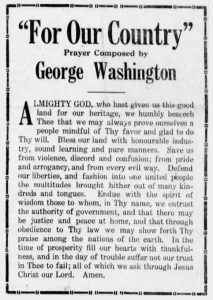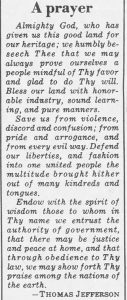On Jan. 3, Speaker Mike Johnson stood before the U.S. House of Representatives on the opening day of the 119th Congress and read what he falsely called “Thomas Jefferson’s prayer.” While that’s not true, he wasn’t misled by a conservative pseudo-historian like David Barton but by the progressive House chaplain.
Like a decades-long game of telephone, the tale of the so-called “Jefferson’s prayer” takes many twists. I pieced together the story of how an Episcopal prayer written after the third president’s death was quoted by a Southern Baptist layman in Congress to baptize a man who advocated for the “wall of separation” between church and state and famously cut the miracles of Jesus out of the New Testament.
Washington Before Jefferson
 The prayer Johnson read was written by Rev. George Lyman Locke in 1882, decades after Jefferson’s death. Following years of lobbying, the prayer was added to the Episcopal Book of Common Prayer in 1928 and appears in the current 1979 version as a prayer “for our country.” There doesn’t appear to be any effort to connect the prayer to Jefferson for four decades after its inclusion in the Episcopal liturgical resource. But even before Episcopalians officially adopted it, many people claimed — without evidence — that a different president composed the prayer.
The prayer Johnson read was written by Rev. George Lyman Locke in 1882, decades after Jefferson’s death. Following years of lobbying, the prayer was added to the Episcopal Book of Common Prayer in 1928 and appears in the current 1979 version as a prayer “for our country.” There doesn’t appear to be any effort to connect the prayer to Jefferson for four decades after its inclusion in the Episcopal liturgical resource. But even before Episcopalians officially adopted it, many people claimed — without evidence — that a different president composed the prayer.
In 1921, three newspapers in Louisiana printed the prayer, titling it “For Our Country” with the note, “Prayer composed by George Washington.” The next year, at least 20 newspapers in 10 states printed the prayer as Washington’s. The prayer sporadically appeared over the next few decades in various papers as written by Washington. No newspaper offered a source for the assertion that Washington wrote it. How did this misattribution occur? The answer might be found at an Episcopal meeting.
In October 1916, delegates to the Episcopal Church’s general convention gathered in St. Louis. News reports note that a commission working on proposed changes to the Book of Common Prayer had a recommended prayer “for our country” that matches the one now included. A delegate, however, urged replacing that one with a prayer Washington offered in a 1783 letter and which Mount Vernon still uses at its public wreath-laying ceremony. A few days later, newspapers reported that the delegates to the House of Deputies approved the recommendation to use Washington’s prayer as the prayer “for our country.” However, it does not appear to have been approved by the House of Bishops. Thus, when the report from the commission came out three years later, they still recommended the prayer Johnson read to be the prayer “for our country” instead of one by Washington.
In between the debate at the convention and the 1928 edition of the Book of Common Prayer, newspapers started printing the Episcopal prayer as composed by Washington but using the title the Episcopal commission was suggesting: “for our country.” Perhaps because of the news attention to the debate, someone mistook the other prayer actually recommended as the one Washington penned. Once printed as Washington’s, the claim spread.
From Washington to “Every Day” Jefferson
 The shift from assigning authorship to Jefferson instead of Washington appears to have started in 1956 but really took off in 1962. The effort attempted to accomplish the same basic mission as the Washington tale: Cast the U.S. as Christian by “proving” the devotion of a key founder. Ironically, this occurs because of people associated with the Thomas Jefferson Foundation that owns and operates Monticello — and that today insists it is “spurious” to say the prayer was written or recited by Jefferson.
The shift from assigning authorship to Jefferson instead of Washington appears to have started in 1956 but really took off in 1962. The effort attempted to accomplish the same basic mission as the Washington tale: Cast the U.S. as Christian by “proving” the devotion of a key founder. Ironically, this occurs because of people associated with the Thomas Jefferson Foundation that owns and operates Monticello — and that today insists it is “spurious” to say the prayer was written or recited by Jefferson.
The Charlottesville Daily Progress reported in 1956 that Rev. Herbert Donovan, pastor of Christ Episcopal Church (which Jefferson gave funds to), read “Jefferson’s prayer for nation” at a luncheon hosted by the Jefferson Foundation. Donovan’s prayer claim didn’t spark more attention until it was picked up six years later by a trustee of the foundation. Henry J. Taylor, who had recently finished serving as U.S. Ambassador to Switzerland during the second Eisenhower term, wrote an April 1962 column published in numerous newspapers through syndication. He argued that “the highest principle” in America is “In God We Trust” and Jefferson was an example of the nation’s “forefathers” following God.
“I have been honored to read at his grave a prayer from Jefferson’s own prayer book — a small brown volume, its pages yellowed with age and frayed in its use in the hands of this great leader,” Taylor wrote. “In seeking the solace that can only come from prayer, in meeting the dark trails on the desperate early years of our republic, in carrying burdens of the Presidency for eight long years and to the day of his death, Jefferson turned to this book and said this prayer for his country.”
For two decades thereafter newspapers printed Taylor’s column about “Jefferson’s prayer” near Jefferson’s birthday.
Meanwhile, another writer, Patrick Scanlan, the conservative managing editor of The Tablet (a Catholic publication in New York), further expanded upon “Jefferson’s prayer.” Penning a column for the April 21, 1962, issue reflecting on Taylor’s column, Scanlan reworked Taylor’s language to make this claim: “Each day of his eight years of the Presidency, and every day thereafter until his death, Jefferson read this prayer.” That adds to what Taylor wrote, but similar claims about Jefferson reciting the prayer every day popped up in other publications over the following decades, as well as in remarks during legislative sessions in Michigan and Pennsylvania just before someone recited the prayer as that day’s invocation.
On Jan. 3 this year, U.S. House Speaker Johnson, in his remarks about “Jefferson’s prayer,” voiced, nearly verbatim, Scanlan’s claim that Jefferson prayed the alleged prayer on a daily basis.
As for the prayer book Donovan and Taylor said contained the prayer, the Charlottesville Daily Progress noted in a 1981 article: “Thomas Jefferson’s prayer book was owned by Christ Church for many years. It was placed in Alderman Library at the University of Virginia, for safe keeping and subsequently stolen.”
A University of Virginia magazine reported in 2019 on items stolen during an unsolved 1973 vault heist. Among the missing items was “Jefferson’s personal copy of the 1796 Book of Common Prayer.” That suggests the original effort to connect Jefferson to the Episcopal prayer may have occurred because someone noted that Jefferson owned a copy of the Book of Common Prayer, then later opened up a contemporary (and thus less fragile) copy to read a prayer from it while unaware that the prayer in question didn’t appear until 1928.
Congressional Prayer Service
After reports about the inaccuracy of Johnson’s claim regarding “Jefferson’s prayer,” thousands of people criticized the speaker on social media for making things up. Many suggested Johnson had been misled by conservative pseudo-historians. However, Johnson literally pointed to his source during his remarks.
“This morning I participated with many of you early this morning in the 119th Congress interfaith prayer service. It was held at St. Peter’s Catholic Church. … I was asked to provide a prayer for the nation,” Johnson said before grabbing a piece of paper to read from. “It said right here in the program, it says right under my name, ‘It is said each day of his eight years of the presidency, and every day thereafter until his death, President Thomas Jefferson recited this prayer.’”
When Johnson made his claim about Jefferson, he was reading from a prayer service program printed and distributed by House Chaplain Margaret Kibben’s office for an event Kibben led. A minister in the Presbyterian Church (U.S.A.) and the first woman to serve as a congressional chaplain, Kibben was selected by then-Speaker Nancy Pelosi. She’s gained some attention for prayers that appeared to criticize Republican politicians trying to overturn the 2020 presidential election and attack lawmakers for not supporting a COVID-19 relief bill. She also pushes Christian Nationalism by justifying the practice of official government prayers and telling U.S. history in ways that privilege Christian prayer.
After an exaggerated version of a false claim about Jefferson was printed in a program by the House chaplain’s office, the speaker of the House with a history of embracing fake quotes to justify Christian Nationalism and attack church-state separation gave the “spurious” claim its biggest platform. This false claim, decades in the making, has received a new burst of support thanks to Kibben and Johnson. It will now be easier for preachers and politicians to also bear false witness about Jefferson’s faith. For, as Jefferson himself actually wrote, “He who permits himself to tell a lie once, finds it much easier to do it a second and third time.”
Brian Kaylor, a member of AU’s Board of Trustees, is president and editor-in-chief of Word&Way and co-author of Baptizing America: How Mainline Protestants Helped Build Christian Nationalism.